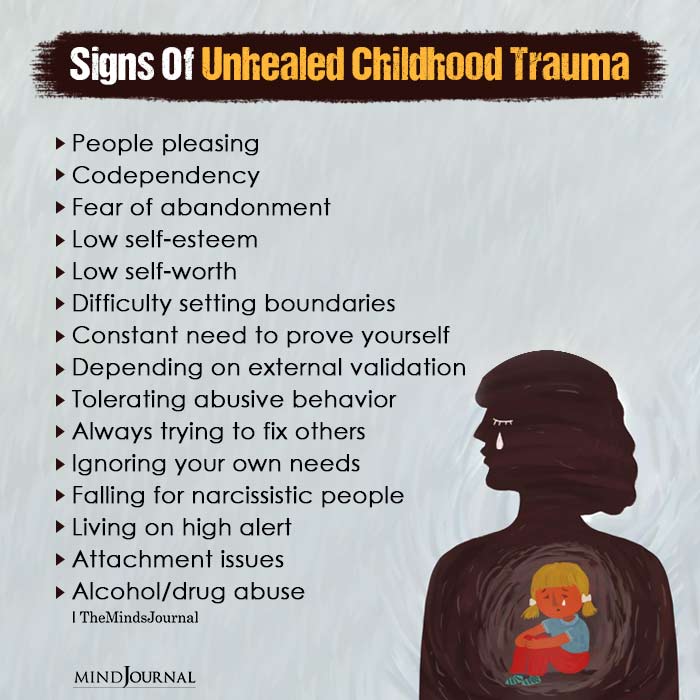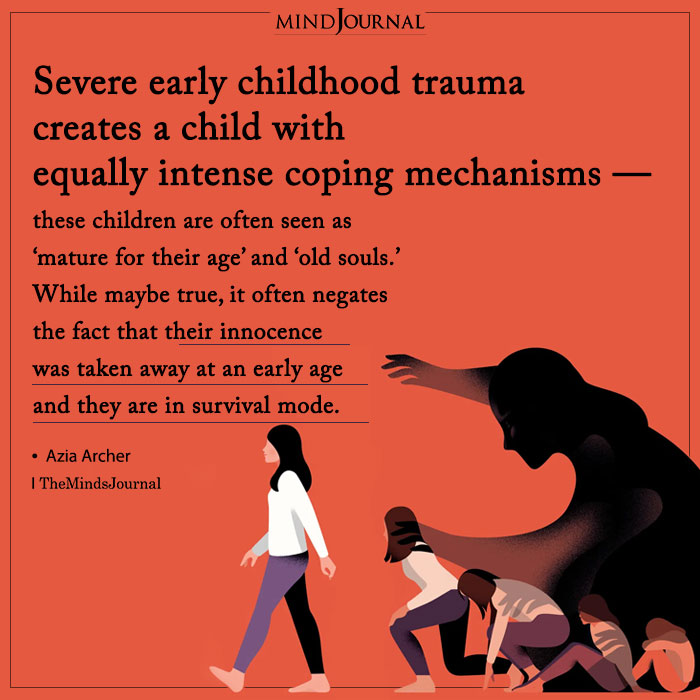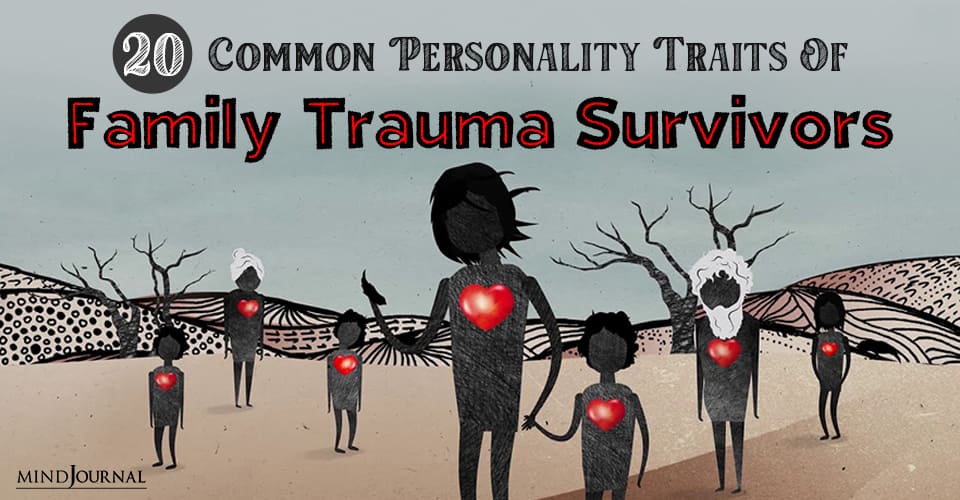Experiencing childhood trauma and family trauma are two of the hardest things a person can go through. This post is all about childhood trauma in adults, the signs of family trauma, and some of the most common personality traits found in family trauma survivors.
In childhood, children lack the tools to understand when something bad or dysfunctional is happening, only that they have to endure the trauma.
As a result, they develop coping skills and mechanisms to deal with it, which leads to adult pathology. “Childhood experiences literally impact the biology of the brain.” (Perry, 2021). More therapists now are aware of the link between childhood trauma and adult personality traits.
In my experience working with survivors, many end up with similar personality traits. Many of these traits can be explained through other means such as being neurodiverse.
However, if you find that you check off many of these, history might have affected them. Also, many neurodiverse individuals experience trauma. Here are the most common traits I have noticed.
Related: The Long-Term Effects of Childhood Trauma In Adulthood
20 Common Personality Traits Of Family Trauma Survivors
1. People-pleasing behaviors
Children who had to fight for the attention of their caregivers learned how to engage in people-pleasing. Instead of having to endure the emotional pain of a caregiver dismissing them, children learn that making them happy makes life easier.
2. High-achievement or perfectionism
Children who grow up in emotionally neglectful environments tend to thrive under high stress, but they are also prone to perfectionism.

3. Constant comparison with others
Some level of comparison is a normal part of being a human. But if you notice yourself constantly comparing yourself with everyone, this could be a sign of low self-esteem or low self-confidence, which often comes from neglectful experiences.
4. Avoiding relationships or getting close to people
If we were hurt or abandoned in childhood, fear of getting hurt again can keep us in fear of getting close to others.
Related: How Childhood Trauma Can Wreck Your Adult Relationships
5. Jumping from relationship to relationship, or staying in a relationship past its expiration date
Just like avoiding relationships can mean avoiding emotional pain, survivors who jump from one relationship to another are often trying to fill the void of their childhood attachment wounds.
If we can somehow prove that we are worthy of love and affection, this heals the inner voice inside us that constantly tells us we are not.
6. Too rigid or too loose boundaries
Setting boundaries that are too loose is a common trait of survivors from environments where their boundaries were not respected. Likewise, those who have too rigid boundaries, to the point of not letting others in, might also be trying to protect themselves.
7. The need to “fix” others
Children who grew up in environments filled with dysfunction might carry the need to help and heal others into their adult relationships.

8. Disordered eating
There is a strong connection between childhood traumas and disordered eating. “Many people with eating disorders often report having suffered some kind of childhood trauma” (Rabito-Alcón et al. 2021).
Many of my clients with binge eating disorder, for example, are trying to fill the chronic loneliness or emptiness they feel.
Related: Childhood Trauma And Eating Disorders: Shocking Facts You Must Know
9. Self-medicating with substances or substance misuse
People who experienced pain are often looking for ways to numb it. While previous generations did not address the link between substance use and trauma, we now know there is a definitive link between substance misuse or addiction and trauma and can use this information in treating clients.
10. Feelings of depression, anxiety, or anger that do not go away
Occasional feelings of depression, anxiety, or anger are normal and could be situational. But studies have shown a link between these physical and mental health symptoms, and childhood trauma, particularly if they are recurring.
11. Experiences of chronic pain
Many studies have connected chronic pain in adulthood with the physical and mental health symptoms of experiencing childhood trauma, especially abuse or neglect.
12. Sensitivity to rejection
After growing up in an environment where caregivers were rejecting, emotionally unavailable, or unsupportive, it is common to develop a sensitivity to rejection.
13. Not feeling seen or heard
Not having these needs met in childhood, leaves survivors with unmet needs. Being left out or not included in conversations, social gatherings, or other events can also trigger the feeling of not being included in the family of origin.
Related: How A Messed Up Childhood Ruins Your Adult Life
14. The need to over-explain or make excuses
In an environment where emotions are shamed or lead to punishment, children grow up with the message that certain feelings or experiences are “bad” or “wrong.” They might feel compelled to over-explain themselves out of fear of not being believed.

15. Feelings of shame and guilt
Survivors of childhood family trauma frequently carry a strong sense of shame and guilt. Children have a natural propensity to self-blame, and they often assume what happened, or didn’t happen, to them is their fault.
16. Poor self-esteem or self-image
In the absence of caregivers who teach children they are valuable, children internalize the message that they are not.
17. Lack of ability to relate to others or being self-conscious
After growing up in an environment with unsafe adults, it is normal to attribute unsafe behaviors towards people outside of the family, which can keep survivors from ever fully trusting others.
Related: How Childhood Wounds End Up Haunting You, Even In Your Adulthood
18. Difficulty expressing emotions
Growing up in an environment where emotions were frowned upon, dismissed, or even ridiculed sets us up for a lifetime of discomfort in expressing uncomfortable emotions.
19. Fears of social situations
When we grow up in environments where interacting with others was scary or even dangerous, it is normal to grow up with a fear of repeating these interactions.

20. Acting in dysfunctional or unhealthy ways toward others
The most common precursor to abuse or violence is the experience of this in childhood. Dysfunctional or bad behaviors are on a spectrum, and we all exhibit some bad behaviors at some point in our lives; this does not mean we are bad people.
This is not to excuse the behavior that caused it but to help us shine a light on the reason behind it and allow for space to grow and heal.
Related: How To Heal From Childhood Trauma When Its Hampering Your Mental Health
If you struggle with some of the above characteristics or personality traits, finding a trauma-informed therapist can help, especially one with knowledge and understanding of family trauma.
References:
Allen, Brian & Lauterbach, Dean. (2007). Personality characteristics of adult survivors of childhood trauma. Journal of traumatic stress. 20. 587-95. 10.1002/jts.20195. Perry, B. 2021. What Happened to You, conversations on trauma, resilience, and healing. New York : Flatiron Books, 2021. Rabito-Alcón, M. F., Baile, J. I., & Vanderlinden, J. (2021). Mediating Factors between Childhood Traumatic Experiences and Eating Disorders Development: A Systematic Review. Children (Basel, Switzerland), 8(2), 114. https://doi.org/10.3390/children8020114
Written By Kaytee Gillis Originally Appeared On Psychology Today










Leave a Reply